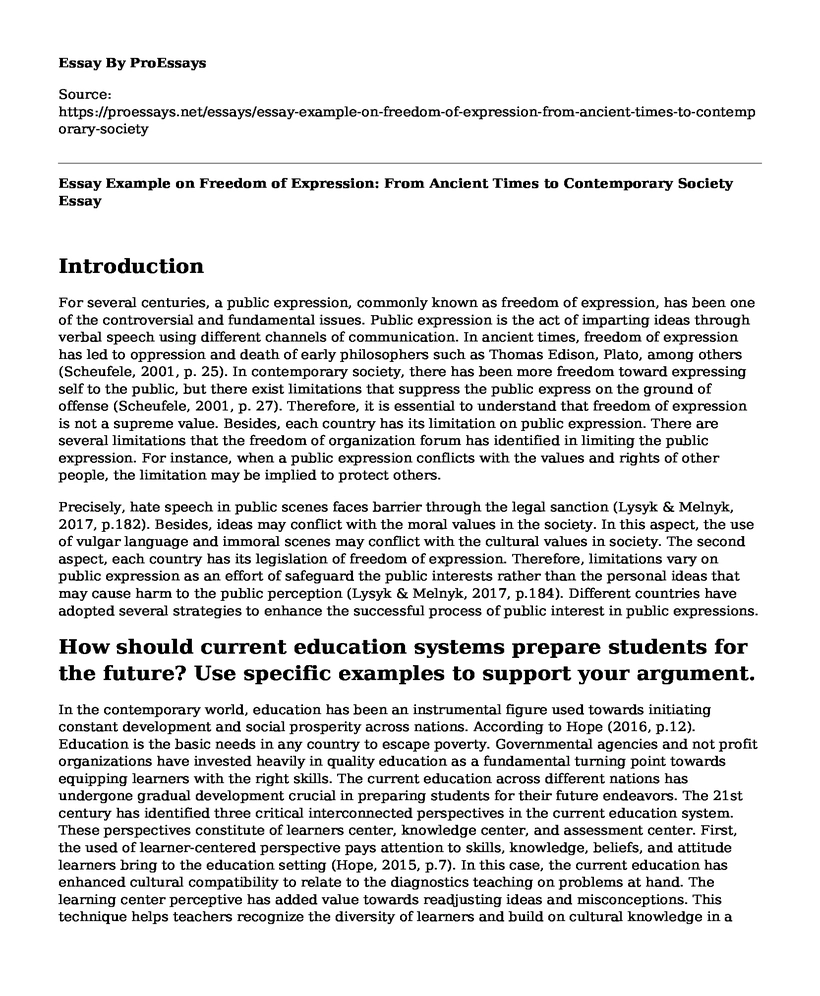Introduction
For several centuries, a public expression, commonly known as freedom of expression, has been one of the controversial and fundamental issues. Public expression is the act of imparting ideas through verbal speech using different channels of communication. In ancient times, freedom of expression has led to oppression and death of early philosophers such as Thomas Edison, Plato, among others (Scheufele, 2001, p. 25). In contemporary society, there has been more freedom toward expressing self to the public, but there exist limitations that suppress the public express on the ground of offense (Scheufele, 2001, p. 27). Therefore, it is essential to understand that freedom of expression is not a supreme value. Besides, each country has its limitation on public expression. There are several limitations that the freedom of organization forum has identified in limiting the public expression. For instance, when a public expression conflicts with the values and rights of other people, the limitation may be implied to protect others.
Precisely, hate speech in public scenes faces barrier through the legal sanction (Lysyk & Melnyk, 2017, p.182). Besides, ideas may conflict with the moral values in the society. In this aspect, the use of vulgar language and immoral scenes may conflict with the cultural values in society. The second aspect, each country has its legislation of freedom of expression. Therefore, limitations vary on public expression as an effort of safeguard the public interests rather than the personal ideas that may cause harm to the public perception (Lysyk & Melnyk, 2017, p.184). Different countries have adopted several strategies to enhance the successful process of public interest in public expressions.
How should current education systems prepare students for the future? Use specific examples to support your argument.
In the contemporary world, education has been an instrumental figure used towards initiating constant development and social prosperity across nations. According to Hope (2016, p.12). Education is the basic needs in any country to escape poverty. Governmental agencies and not profit organizations have invested heavily in quality education as a fundamental turning point towards equipping learners with the right skills. The current education across different nations has undergone gradual development crucial in preparing students for their future endeavors. The 21st century has identified three critical interconnected perspectives in the current education system. These perspectives constitute of learners center, knowledge center, and assessment center. First, the used of learner-centered perspective pays attention to skills, knowledge, beliefs, and attitude learners bring to the education setting (Hope, 2015, p.7). In this case, the current education has enhanced cultural compatibility to relate to the diagnostics teaching on problems at hand. The learning center perceptive has added value towards readjusting ideas and misconceptions. This technique helps teachers recognize the diversity of learners and build on cultural knowledge in a classroom. Secondly, adopting knowledge centered education system instilling skills to learner necessary to think and solve problems. This perspective set thinking skills which involve well-organized bodies of strategies regarding life goals (Hope, 2015, p.7). Also, this perspective focuses on activities and information that are important in understanding specific disciplines. Thirdly, the adoption of the assessment centered education system measures the learning activities in every learner (Hope, 2015, p.7). This program will help the instructor evaluate futuristic plans to improve the learning process in class.
References
Hope, J. (2015). Integrate career, academic services to help students prepare for the future. Dean and Provost, 16(8), pp.1-7.
Hope, J. (2016). Prepare students for the future with education about diversity. Dean and Provost, 17(8), pp.12-12. How People Learn. (2000). National Academies Press.
Lysyk, V., and Melnyk, A. (2017). Legal Limitation Freedom Of Expression: International Legal Aspect. Visnyk of the Lviv University. Series International Relations, (42), pp.180-191.
Scheufele, D. (2001). Perceptions of 'Public Opinion' and 'Public' Opinion Expression. International Journal of Public Opinion Research, 13(1), pp.25-44.
Cite this page
Essay Example on Freedom of Expression: From Ancient Times to Contemporary Society. (2023, Jan 16). Retrieved from https://proessays.net/essays/essay-example-on-freedom-of-expression-from-ancient-times-to-contemporary-society
If you are the original author of this essay and no longer wish to have it published on the ProEssays website, please click below to request its removal:
- The National Rifles Association Analysis
- Research Paper on Population Health Policy Analysis
- The Process of Development of Application of Health Policy - Paper Example
- US Imperialism and Empire Building Essay
- Rhetorical Devices in I Have a Dream Speech by Martin Luther King
- Free Paper on Harlem Renaissance: African-American Cultural Revival Amidst Oppression
- Essay Example on Marijuana Use in Legalized States: 1979-2016 Review







